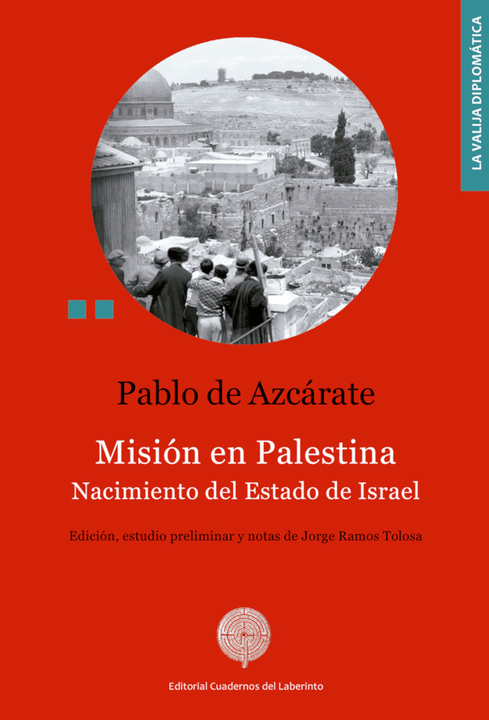Books and publications
Index / Activities / Books and publications / “Mission in Palestine 1948-1952: Birth of the State of Israel”
“Mission in Palestine 1948-1952: Birth of the State of Israel”
May 22, 20197:00 p.m.
MADRID
Casa Árabe Ambassadors’ Hall (at Calle Alcalá, 62, First Floor).
7:00 p.m.
Free entry until the event’s capacity is reached.
In Spanish.
Casa Árabe, the Association of Spanish Diplomats and the publishing firm
Cuadernos del Laberinto have organized the presentation of this book
authored by Pablo de Azcárate. It will be taking place in Madrid on
Wednesday, May 22.
Taking part in the event are Pedro Martínez-Avial, the General Director of Casa Árabe; Eva Martínez, the Director General for the Maghreb, Mediterranean and Near East; Jorge Ramos Tolosa, author of this edition of the book and a professor of Contemporary History at the University of Valencia, and Luis de Azcárate, the nephew of Pablo de Azcárate and author of Memorias de un republicano (Memories of a Republican). Moderated by: Sergio Colina Martín, member of the editorial committee of “La Valija Diplomática”.
By publishing a new edition of this work, which originally came out in Spain in 1968, La Valija Diplomática is attempting to contribute to bringing back the memory of some of the great figures in our recent (diplomatic) history. In this case, they seek to remember the figure of Pablo de Azcárate and his career as a senior member of the League of Nations, an Ambassador of Spain in London and, later, a civil servant at the United Nations, as well as his personal commitment, which, like so many others, forced him into exile. Moreover, through the first-hand reflections of a privileged observer, and from the vantage point of a specific historical time and context, Mission in Palestine offers interesting reflections on one of the most notable episodes in the twentieth century, with shadows cast over the world still today: the partition of Palestine, the Nakba and the creation of the State of Israel.
Presentation information sheet
The collection titled “La Valija Diplomática” (“The Diplomatic Pouch”) is a publishing firm project promoted by the Association of Spanish Diplomats, aimed at furthering the publication of unpublished works written by diplomats, who are thus able to share their personal and professional experiences. The collection was created in the year 2000 by Ambassador Alonso Álvarez de Toledo, who also directed the collection during its first fifteen years of existence.
Pablo de Azcárate (Madrid, 1890-Geneva, 1971) may be regarded as one of Spain’s most important diplomats on the world stage during the first half of the twentieth century. He became the youngest tenured professor of Spain, a member of parliament, a civil servant and a senior member of the League of Nations, the Ambassador of the Second Spanish Republic to the United Kingdom during the Spanish Civil War and a UN representative in Palestine-Israel. From 1948 to 1952, this Spanish diplomat held several positions as an international civil servant for the United Nations in the territory located between the River Jordan and the Mediterranean Sea. Azcárate was attaché to the head secretary of the Palestine Commission, an interim municipal commissioner of Jerusalem, a representative of the mediator for Egypt and the Arab League, and the head secretary of both the Consular Truce Commission and the Palestine Conciliation Commission. He was therefore one of the international personages to live the events in Israel-Palestine directly in the field during those years, bearing witness and providing notable testimony of the role played by the UN in that context.
By publishing a new edition of this work, which originally came out in Spain in 1968, La Valija Diplomática is attempting to contribute to bringing back the memory of some of the great figures in our recent (diplomatic) history. In this case, they seek to remember the figure of Pablo de Azcárate and his career as a senior member of the League of Nations, an Ambassador of Spain in London and, later, a civil servant at the United Nations, as well as his personal commitment, which, like so many others, forced him into exile. Moreover, through the first-hand reflections of a privileged observer, and from the vantage point of a specific historical time and context, Mission in Palestine offers interesting reflections on one of the most notable episodes in the twentieth century, with shadows cast over the world still today: the partition of Palestine, the Nakba and the creation of the State of Israel.
Presentation information sheet
The collection titled “La Valija Diplomática” (“The Diplomatic Pouch”) is a publishing firm project promoted by the Association of Spanish Diplomats, aimed at furthering the publication of unpublished works written by diplomats, who are thus able to share their personal and professional experiences. The collection was created in the year 2000 by Ambassador Alonso Álvarez de Toledo, who also directed the collection during its first fifteen years of existence.
Pablo de Azcárate (Madrid, 1890-Geneva, 1971) may be regarded as one of Spain’s most important diplomats on the world stage during the first half of the twentieth century. He became the youngest tenured professor of Spain, a member of parliament, a civil servant and a senior member of the League of Nations, the Ambassador of the Second Spanish Republic to the United Kingdom during the Spanish Civil War and a UN representative in Palestine-Israel. From 1948 to 1952, this Spanish diplomat held several positions as an international civil servant for the United Nations in the territory located between the River Jordan and the Mediterranean Sea. Azcárate was attaché to the head secretary of the Palestine Commission, an interim municipal commissioner of Jerusalem, a representative of the mediator for Egypt and the Arab League, and the head secretary of both the Consular Truce Commission and the Palestine Conciliation Commission. He was therefore one of the international personages to live the events in Israel-Palestine directly in the field during those years, bearing witness and providing notable testimony of the role played by the UN in that context.

